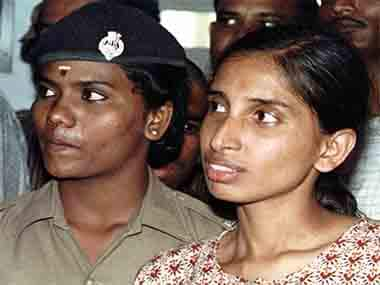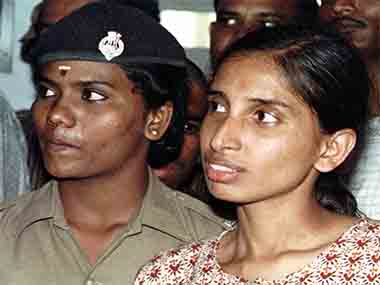Did Afzal Guru have a chance to survive, had he not been sent to the gallows in total secrecy when his clemency petition was rejected? Looks like he had, going by what Justice KT Thomas, one of the SC judges who confirmed the death sentence of the convicts in the Rajiv Gandhi assassination case, says now. As reported by
Times of India on 24 February
, Justice KT Thomas, former Kerala HC and SC judge, feels that it would be constitutionally wrong to hang the three convicts for it would amount to handing out two sentences for a single offense. This is what he told Arun Janardhanan of TOI: “For any life imprisonment, every prisoner is entitled to have a right to get his case reviewed by the jail authorities (to determine) whether remission can be announced or not. Since the accused in Rajiv Gandhi case were death convicts, they underwent a long period of imprisonment without even having the benefit of life imprisonment… This appears to be a third type of sentence, something which is unheard and constitutionally incorrect. If they are hanged today or tomorrow, they will be subjected to two penalties for one offense”. [caption id=“attachment_638308” align=“alignleft” width=“380”]
 FILE PHOTO 15JUN91 - Nalini (R) seen in a court in the southern Indian city of Chengalpattu in this June 15,1991. Reuters[/caption] In simple words, 22 years of jail and subsequent hanging are two distinct penalties for a single office - life imprisonment and death - which is constitutional injustice. Referring to a later SC judgement, Justice Thomas also goes on to add that his bench should have considered the antecedents of the convicts and alludes to a possible judgement of error: “It was only many years thereafter a bench headed by Justice S B Sinha pointed out that without considering the nature and character of accused, a death sentence should never be awarded. His judgments mentioned errors in previous SC judgments and that applies to Rajiv Gandhi assassination case.” In other words, Justice Thomas does concur with the argument of human rights activists that SC judgments are not absolutely error-proof and hence there should always be ample avenues for review, particularly in cases involving death penalties. If the State killing its citizens is unethical as anti-death penalty activists say, how does one describe judgements which might not be 100 per cent error-free? This is precisely what the rights activists have been saying in the case of Guru - that his death penalty should have been reviewed and that he should have been allowed to pursue other legal avenues after his clemency plea was rejected, as the Rajiv assassination convicts have done. Yet another verdict of the Supreme Court that makes Guru seem wronged is the recent stay on the execution of four Veerappan aides till it heard the decision of another bench. The aides had approached the SC bench for commutation of their death sentence because they had already spent nine years in jail for the same offence. The hanging of the Rajeev case convicts had also been stayed on similar grounds. Whether ultimately the courts clear the decks for their hanging or not, the point is that both the Veerappan aides and the Rajiv Gandhi assassination convicts had had legal recourses that saved them from the gallows even after their mercy pleas were dismissed. Isn’t it gross injustice that Guru was denied this opportunity? That too, so arbitrarily? Now, going by the opinion of Justice KT Thomas, who is highly respected for his acumen in jurisprudence and record as a HC and SC judge, both the set of convicts have a solid case on the grounds of double jeopardy. Guru also had spent ten years in jail before he was hanged in a legally sterile and frightening secrecy. His case was no different from that of Veerappan aides or Rajiv assassination convicts. Even if the Veerappan aides and Rajiv case convicts get a longer lease of life, but are ultimately hanged, Afzal Guru will certainly remain wronged. Would we be able to wash away the guilt of smothering him to death when he could have at least screamed for a little more time? Who knows if he indeed did that? Perhaps more than the guilt, what should scare an Indian citizen on the streets is the chance of being trapped in situations where one is a political target that everybody wants to kill. Or nobody wants to touch. The realisation that it can happen to anybody, except those with connections and money, is mortally frightening.
FILE PHOTO 15JUN91 - Nalini (R) seen in a court in the southern Indian city of Chengalpattu in this June 15,1991. Reuters[/caption] In simple words, 22 years of jail and subsequent hanging are two distinct penalties for a single office - life imprisonment and death - which is constitutional injustice. Referring to a later SC judgement, Justice Thomas also goes on to add that his bench should have considered the antecedents of the convicts and alludes to a possible judgement of error: “It was only many years thereafter a bench headed by Justice S B Sinha pointed out that without considering the nature and character of accused, a death sentence should never be awarded. His judgments mentioned errors in previous SC judgments and that applies to Rajiv Gandhi assassination case.” In other words, Justice Thomas does concur with the argument of human rights activists that SC judgments are not absolutely error-proof and hence there should always be ample avenues for review, particularly in cases involving death penalties. If the State killing its citizens is unethical as anti-death penalty activists say, how does one describe judgements which might not be 100 per cent error-free? This is precisely what the rights activists have been saying in the case of Guru - that his death penalty should have been reviewed and that he should have been allowed to pursue other legal avenues after his clemency plea was rejected, as the Rajiv assassination convicts have done. Yet another verdict of the Supreme Court that makes Guru seem wronged is the recent stay on the execution of four Veerappan aides till it heard the decision of another bench. The aides had approached the SC bench for commutation of their death sentence because they had already spent nine years in jail for the same offence. The hanging of the Rajeev case convicts had also been stayed on similar grounds. Whether ultimately the courts clear the decks for their hanging or not, the point is that both the Veerappan aides and the Rajiv Gandhi assassination convicts had had legal recourses that saved them from the gallows even after their mercy pleas were dismissed. Isn’t it gross injustice that Guru was denied this opportunity? That too, so arbitrarily? Now, going by the opinion of Justice KT Thomas, who is highly respected for his acumen in jurisprudence and record as a HC and SC judge, both the set of convicts have a solid case on the grounds of double jeopardy. Guru also had spent ten years in jail before he was hanged in a legally sterile and frightening secrecy. His case was no different from that of Veerappan aides or Rajiv assassination convicts. Even if the Veerappan aides and Rajiv case convicts get a longer lease of life, but are ultimately hanged, Afzal Guru will certainly remain wronged. Would we be able to wash away the guilt of smothering him to death when he could have at least screamed for a little more time? Who knows if he indeed did that? Perhaps more than the guilt, what should scare an Indian citizen on the streets is the chance of being trapped in situations where one is a political target that everybody wants to kill. Or nobody wants to touch. The realisation that it can happen to anybody, except those with connections and money, is mortally frightening.
What Justice Thomas' statement on Rajiv killers really means
G Pramod Kumar
• February 25, 2013, 13:13:44 IST
Going by the opinion of Justice KT Thomas, who is highly respected for his acumen in jurisprudence and record as a HC and SC judge, both the set of convicts have a solid case on the grounds of double jeopardy.
Advertisement
)
End of Article